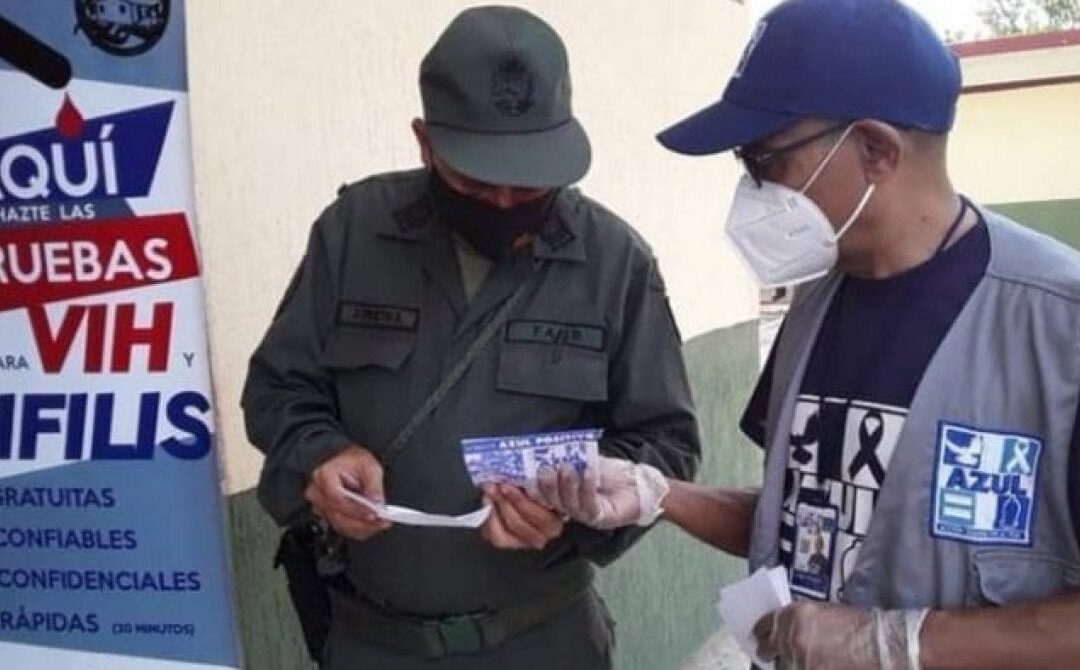
Feb 6, 2021 | News
The recent, ongoing and unwarranted detention of five members of the Venezuelan NGO ‘Azul Positivo’ is one more event in a series of threats, harassment, attacks, restrictions, reprisals and criminal proceedings against Venezuelan civil society organizations and human rights defenders, which has been intensifying since November 2020.
In recent months and weeks, state agents have forcibly entered the offices of civil society organizations; public threats have been made against defenders who have been engaging with human rights mechanisms, NGO bank accounts have been frozen and arrest warrants issued for aid workers.
Venezuelan civil society operate in a context of serious legal and administrative obstacles with domestic laws used to target human rights defenders, such as the ‘Law Against Hate’, or having the effect of limiting the operations of NGOs and restricting their access to funding, essentially blocking the work of many organizations vital for Venezuelans in need.
In a public statement, a number of UN independent human rights experts and regional experts have described threats and measures taken against Venezuelan civil society since November 2020 as amounting to ‘systematic persecution and stigmatization.’
It is essential that humanitarian and human rights organizations responding to the grave humanitarian and human rights crises in the country, pushing for accountability for violations and abuses and the return of guarantees provided by democratic institutions and processes are able to do their work without fear or hindrance.
Human rights defenders are critical, constructive and essential to democracies and the functioning of the rule of law. Attempts to silence and cow them are counterproductive and shameful.
We urge the Venezuelan authorities to ensure that harassment and threats against Venezuelan defenders stop and for all international legal guarantees to be respected. We call on all states and UN bodies and agencies to actively support civil society organizations, defenders and activists and to speak up loudly and consistently for the right to defend human rights in Venezuela and globally.
We are inspired by the daily commitment and courage of Venezuelan human rights defenders and humanitarian workers and stand in solidary with our Venezuelan partners and friends.
Amnesty International
Center for Justice and International Law (CEJIL)
CIVICUS
Civil Rights Defenders
Conectas Diretos Humanos
Freedom House
Global Centre for the Responsibility to Protect
Human Rights Watch
International Commission of Jurists
International Service for Human Rights
People in Need
Washington Office on Latin America (WOLA)
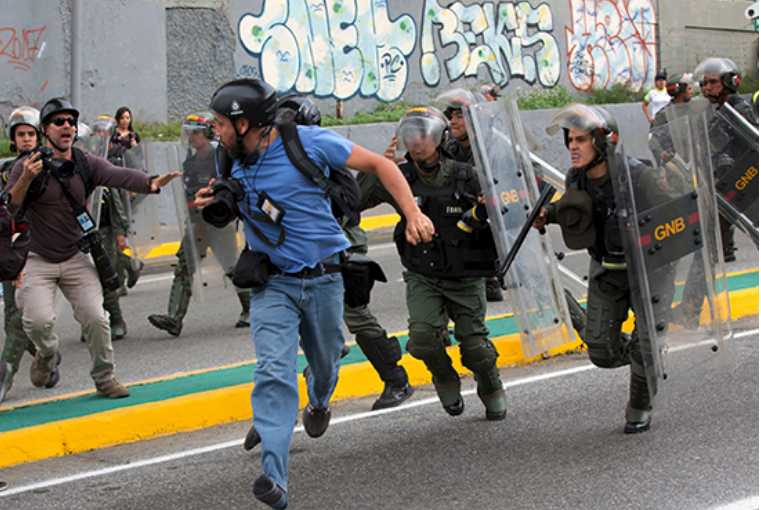
Feb 5, 2021 | Advocacy, Non-legal submissions
Today, the ICJ joined several human rights NGOs to stand in solidarity with Venezuelan NGOs subject to threats, harassment, attacks, restrictions, reprisals and criminal proceedings by State authorities.
The joint statement reads as follows:
The recent, ongoing and unwarranted detention of five members of the Venezuelan NGO ‘Azul Positivo’ is one more event in a series of threats, harassment, attacks, restrictions, reprisals and criminal proceedings against Venezuelan civil society organizations and human rights defenders, which has been intensifying since November 2020.
In recent months and weeks, state agents have forcibly entered the offices of civil society organizations; public threats have been made against defenders who have been engaging with human rights mechanisms, NGO bank accounts have been frozen and arrest warrants issued for aid workers.
Venezuelan civil society operate in a context of serious legal and administrative obstacles with domestic laws used to target human rights defenders, such as the ‘Law Against Hate’, or having the effect of limiting the operations of NGOs and restricting their access to funding, essentially blocking the work of many organizations vital for Venezuelans in need.
In a public statement, a number of UN independent human rights experts and regional experts have described threats and measures taken against Venezuelan civil society since November 2020 as amounting to ‘systematic persecution and stigmatization.’
It is essential that humanitarian and human rights organizations responding to the grave humanitarian and human rights crises in the country, pushing for accountability for violations and abuses and the return of guarantees provided by democratic institutions and processes are able to do their work without fear or hindrance.
Human rights defenders are critical, constructive and essential to democracies and the functioning of the rule of law. Attempts to silence and cow them are counterproductive and shameful.
We urge the Venezuelan authorities to ensure that harassment and threats against Venezuelan defenders stop and for all international legal guarantees to be respected.
We call on all states and UN bodies and agencies to actively support civil society organizations, defenders and activists and to speak up loudly and consistently for the right to defend human rights in Venezuela and globally.
We are inspired by the daily commitment and courage of Venezuelan human rights defenders and humanitarian workers and stand in solidary with our Venezuelan partners and friends.
Signatories:
- Amnesty International
- Center for Justice and International Law (CEJIL)
- CIVICUS
- Civil Rights Defenders
- Conectas Diretos Humanos
- Freedom House
- Global Centre for the Responsibility to Protect
- Human Rights Watch
- International Commission of Jurists
- International Service for Human Rights
- People in Need
- Washington Office on Latin America (WOLA)
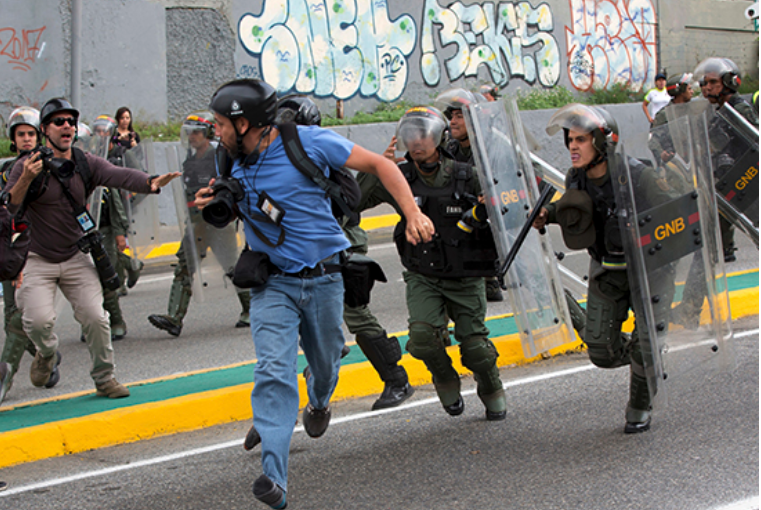
Jan 15, 2021 | News
The recent campaigns of stigmatization, harassment, and repression against the media in Venezuela constitute a clear attack against the freedoms of expression and of access to information and infringe upon journalists’ important contributions to expose human rights violations committed by the authorities.
These attacks follow incidents of harassment of other organizations and may be part of a broader campaign against civil society in Venezuela, through which the authorities undermine the work that these groups carry out in defense of human rights.
The media outlet Efecto Cocuyo, community radio channel Fe y Alegría, as well as the National Press Workers Union, VPI TV, and news journal Panorama, among other media outlets, have become the target of stigmatization campaigns and legal scrutiny by the authorities that respond to Nicolás Maduro.
According to Venezuelan human rights organization PROVEA, during the first 8 months of the state of emergency declared in response to the pandemic, 66 journalists and media staff have been detained in Venezuela.
Since January 6, 2021, independent media organizations such as Efecto Cocuyo and El Pitazo have been accused, first by pro-government media and later by Venezuelan authorities—including Maduro himself—of advancing foreign “interference” efforts in exchange for international cooperation.
At the same time, digital news channel VPI TV was subject to an arduous audit and the seizure of its equipment from its office in Caracas, which provoked the “temporary” closing of its operations.
On January 8, daily newspaper Panorama announced on social media that its operations had been closed for five days by the National Integrated Service for the Administration of Customs Duties and Taxes (SENIAT), on the grounds of “incompliance with formal duties and tax obligations.” The media organization complied with this order to close.
Other media groups have faced attacks by unknown actors during this same period. One example is the digital newspaper Tal Cual, which on January 8 reported that it had been the target of a 3 hour-long digital attack, during which staff experienced difficulties accessing their own web page.
The government of Nicolás Maduro frequently uses public accusations and other forms of harassment to intimidate and attempt to silence those who criticize the government, express ideas contrary to its policies, or denounce human rights violations—including against humanitarian actors—all of which undermines the right to freedom of expression.
These patterns of harassment amount to serious attacks against the integrity, freedom, and judicial guarantees of human rights defenders and journalists.
According to High Commissioner for Human Rights Michelle Bachelet, in Venezuela “journalists and human rights defenders critical of the government continue to face intimidation and public defamation,” and there are clear “restrictions on the freedom of expression,” including the “application of legislation against targeted groups, attacks against human rights defenders and the detention of journalists.”
Human rights violations occur in a systematic and generalized manner in Venezuela, and the United Nations Fact-Finding Mission found “reasonable grounds to believe” that crimes against humanity were committed in Venezuela between 2014 and 2020.
The Venezuelan authorities have a responsibility to prevent such harassment and attacks, and to abstain from encouraging or committing them.
The occurrence and recurrence of these types of actions, including the persecution of human rights defenders and journalists, the violation of their freedom of expression or illegal or arbitrary detention, or the eventual criminalization of international support for human rights defenders, may amount to serious human rights violations or crimes under international law.
The below organizations condemn these incidents and firmly demand that authorities under the command of Nicolás Maduro put an end to the harassment and attacks against media outlets, journalists, and human rights defenders.
We also request that the authorities guarantee respect for the informative work of these groups and their freedom of expression, as well as their contributions to expose human rights abuses and violations committed in Venezuela.
Signing organizations:
Amnesty International
Conectas
International Commission of Jurists
Human Rights Watch
Washington Office on Latin America (WOLA)
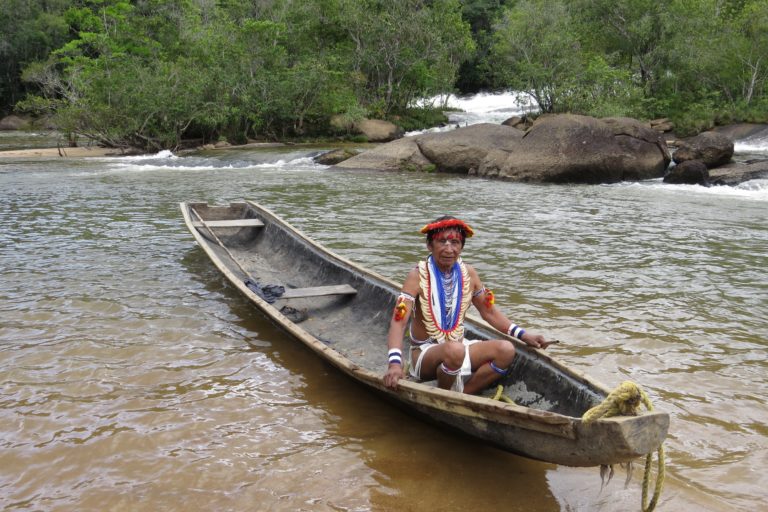
Sep 30, 2020 | Feature articles, News
Venezuela is suffering from an unprecedented human rights and humanitarian crisis that has deepened due to the dereliction by the authoritarian government and the breakdown of the rule of law in the country.
The International Organization for Migration (IOM) has estimated that some 5.2 million Venezuelans have left the country, most arriving as refugees and migrants in neighbouring countries.
The Office of the United Nations High Commissioner for Human Rights (OHCHR) in 2018 had categorized this situation of human rights, as “a downward spiral with no end in sight”.
The situation of the right to health in Venezuela and its public health system showed structural problems before the pandemic and was described as a “dramatic health crisis (…) consequence of the collapse of the Venezuelan health care system” by the High Commissioner.
Recently, the OHCHR submitted a report to the Human Rights Council, in which it addressed, among other things the attacks on indigenous peoples’ rights in the Arco Minero del Orinoco (Orinoco’s Mining Arc or AMO).
Indigenous peoples’ rights and the AMO mining projects before the covid-19 pandemic
Indigenous peoples have been traditionally forgotten by government authorities in Venezuela and condemned to live in poverty. During the humanitarian crisis, they have suffered further abuses due to the mining activity and the violence occurring in their territories.
In 2016, the Venezuelan government created the Orinoco’s Mining Arc National Strategic Development Zone through presidential Decree No. 2248, as a mega-mining project focused mainly in gold extraction in an area of 111.843,70 square kilometres.
It is located at the south of the Orinoco river in the Amazonian territories of Venezuela and covers three states: Amazonas, Bolívar and Delta Amacuro.
It is the habitat for several indigenous ethnic groups[1] who were not properly consulted before the implementation of the project.
The right to land of indigenous peoples is recognized in the Venezuelan Constitution. Yet, as reported by local NGO Programa Venezolano de Educación- Acción en Derechos Humanos (PROVEA), the authorities have shown no progress in the demarcation and protection of indigenous territories since 2016.
Several indigenous organizations and other social movements have expressed concern and rejected the AMO project.
The implementation of this project has negatively impacted indigenous peoples’ rights to life, health and a safe, healthy and sustainable environment. Human Rights Watch, Business and Human Rights Resource Center, local NGO’s, social movements and the OHCHR, have documented the destruction of the land and the contamination of rivers due to the deforestation and mining activity, which is also contributing to the growth of Malaria and other diseases.
Indigenous women and children are among the most affected. The Pan-American Health Organization (PAHO) has reported that “the indigenous populations living in border areas of Venezuela are highly vulnerable to epidemic-prone diseases”, and it raised a special concern about the Warao people (Venezuela and Guyana border) and Yanomami people (Venezuela and Brazil border).
Women and children also face higher risks of sexual and labour exploitation and of gender-based violence in the context of mining activities.
The High Commissioner’s recent report mentions that there is “a sharp increase since 2016 in prostitution, sexual exploitation and trafficking in mining areas, including of adolescent girls.”
In addition, the United Nations Office for the Coordination of Humanitarian Affairs (OCHA) and the United Nations Children’s Fund (UNICEF) have identified a trend among adolescents of dropping out of school particularly between the ages of 13 and 17. Indigenous individuals are acutely affected, as many children leave to become workers at the mines.
Violence and crime have also increased in the AMO. Criminal organizations and guerrilla and paramilitary groups are present in the zone, and the Venezuelan government has expanded its military presence. Indigenous leaders and human rights defenders have been targets of attacks and threats; and there is a persistence of allegations of cases of enforced disappearances and extrajudicial and arbitrary killings.
Current situation under COVID-19 pandemic
The COVID-19 pandemic and the lack of adequate response to it has aggravated this situation.
The government declared a state of emergency (estado de alarma) on 13 March and established a mandatory lockdown and social distancing measures. Yet mining activities have continued without adequate sanitary protocols to prevent the spread of the pandemic.
The State of Bolívar -the largest state of the country which is located in the Orinoco Mining Arc- has among the highest numbers of confirmed cases of COVID-19 which have included indigenous peoples.
The Venezuelan authorities’ response to the pandemic in these territories has not considered culturally appropriate measures for them. In addition, although authorities established a group of hospitals and medical facilities called “sentinel centres” to attend persons with COVID-19 symptoms, they are located in cities while indigenous communities live far from cities.
Furthermore, the lack of petrol in the country aggravates the obstacles to easy transportation to these centres.
Civil society organizations and indigenous leaders complain about the lack of COVID-19 tests and the data manipulation of the real situation of the pandemic. Also, the OHCHR reported the arbitrary arrest of at least three health professionals for denouncing the lack of basic equipment and for providing information about the situation of COVID-19, and stressed that there are “restrictions to civic and democratic space, including under the “state of alarm” decreed in response to the COVID-19 pandemic.”
[1] At least Kari’ña, Warao, Arawak, Pemón, Ye’kwana, Sanemá o Hotï, Eñe’pa, Panare, Wánai, Mapoyo, Piaroa and Hiwi.
Download
Venezuela-COVID19 indigenous-News Feature articles-2020-ENG (full article with additional information, in PDF)
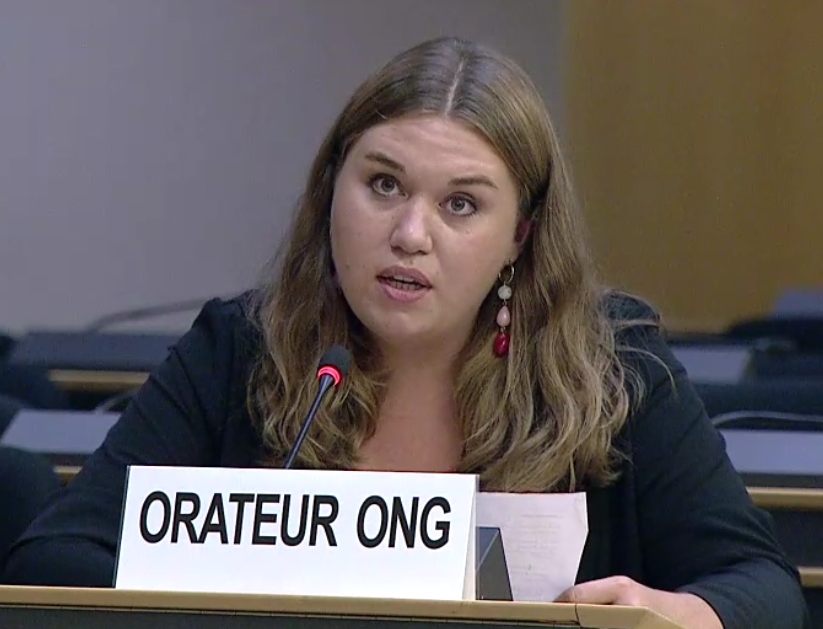
Sep 24, 2020 | Advocacy, Non-legal submissions
The ICJ today highlighted the continuing impunity in Venezuela, reinforced by lack of judicial independence, at the UN Human Rights Council in Geneva.









